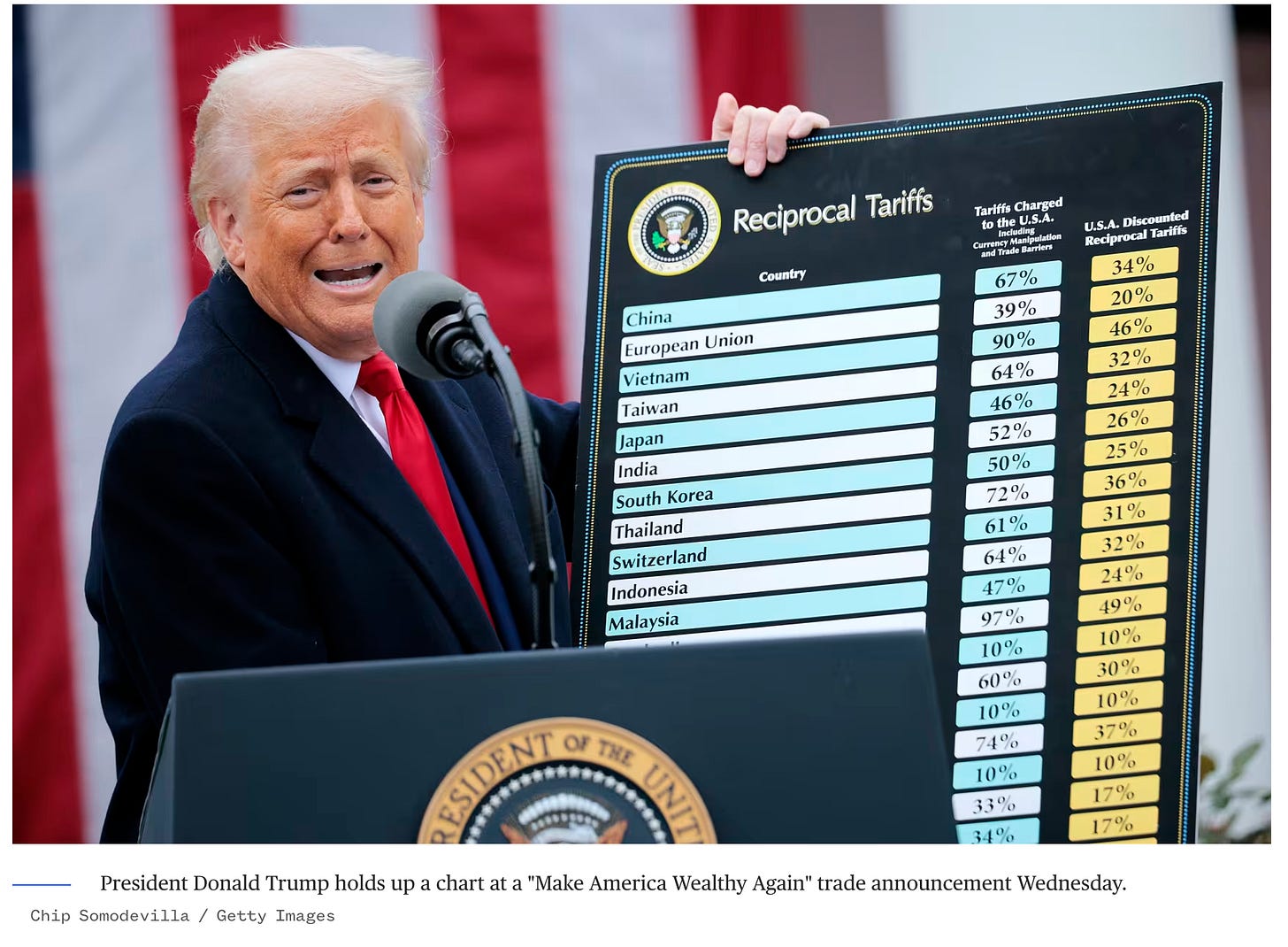Good news for oil and gas in President Trump's Tariffs
The tariffs do not apply to energy imports from any other country.
Even though the world knew President Trump’s tariffs were coming, the reality of his tariff policies stunned the world yesterday afternoon, Wednesday, April 2, 2025. As of 2:30 PM CST today, the U.S. stock market was expressing its displeasure with the largest point drop in the Dow Jones Industrial Average since March 16, 2020, when the Dow dropped 2,997 points, driven by fears over the COVID-19 pandemic.
The good news for the U.S. oil and gas industry is that imports of oil, natural gas, and refined products are exempt from all new tariffs. After the new tariffs were announced yesterday, Reuters reported:
[A White House official said] President Trump’s tariffs do not apply to energy imports from Canada or Mexico – which are already exempted under the United States-Mexico-Canada Agreement free trade deal – nor do they apply to energy imports from any other country (emphasis added).
Reuters followed up this morning:
First, these announcements provide the industry with some clarity. True, the proposed tariffs are likely to shift around in the coming months as Trump tries to wring concessions out of trading partners. But at least now everyone knows the baseline they're working with.
And the fact that all U.S. imports of oil, gas and refined products were exempted from the tariff plans should let the industry breathe a partial sigh of relief.
It is good to remember that despite the huge growth in U.S. energy production and exports over the last decade, it continues to import a large amount of oil due to its large domestic refining capacity of 18.4 million barrels per day.
The U.S. imported 6.6 million bpd in 2024, including 4 million bpd from neighbouring Canada and 464,000 bpd from Mexico.
Second, traders can assume that, despite all the changes these lofty and oddly designed tariffs might bring, they probably won't dislodge the United States from its dominant position in global energy markets.
The United States was the world's top exporter of liquefied natural gas (LNG) in 2024, ahead of Qatar and Australia, with the majority of U.S. volumes going to the European Union.
Additionally, it exported 4.1 million bpd of crude last year, according to the Energy Information Administration, more than 10 times the total one decade prior. Europe imported 48% of the volumes in 2024, followed by South Korea at 12%, and India and Taiwan at 6% each.
In theory, the concentration of oil and gas in the U.S.'s export basket could be considered a vulnerability. But in reality, governments will likely think twice before hitting U.S. energy imports with tariffs.
Why? Because these countries have very few alternative sources of supply, and higher energy costs would make it very challenging for them to boost their economies to offset the tariff pain.
If anything, countries under fire from Trump's trade war will seek to purchase more U.S. energy to placate the administration.
Indeed, European Commission President Ursula von der Leyen has in recent months already suggested the EU could increase its purchases of U.S. LNG at the expense of Russian fuel in order to reduce the bloc’s trade deficit with the United States (emphasis added).
Energy markets may remain volatile in the short term as traders absorb the tariff sticker shock, but once the dust settles, the oil and gas industry may find that the outlook isn't so grim.
Unrelated to President Trump’s reciprocal tariffs, eight OPEC+ nations announced this morning that they will increase output by 411,000 bpd in May, which is triple the anticipated monthly increase. Traders did not expect this much this soon, and crude oil prices dropped sharply, with West Texas Intermediate dropping more than 7%.
My Take
While energy traders assess the potential impact on oil and gas prices worldwide, the U.S. oil and gas industry appears to have survived "Liberation Day" relatively unscathed. The OPEC decision to increase crude oil production seemed to have a more significant impact on crude oil than the Trump tariffs.
Remember, the tariffs announced yesterday are somewhat reciprocal. Any country that does not like President Trump's tariffs can open a conversation to have them reduced or removed. It is all about “the art of the deal.”
Thank you for reading “Thoughts about Energy and Economics.” This publication is reader-supported, so please “Like” it, share it with friends and colleagues, and become a paid subscriber. Your support is greatly appreciated!





Oil companies (at least the ones that drill for oil and gas vs. downstream only) thrive on the price of oil. Chart oil price at the wellhead vs. oil company profits for the last 40 years and you'll see a direct correlation. Thus, as the price gets lower (better for the consumer, however), oil companies will suffer big time. I have to call BS on Trump and Tariffs good for oil companies.